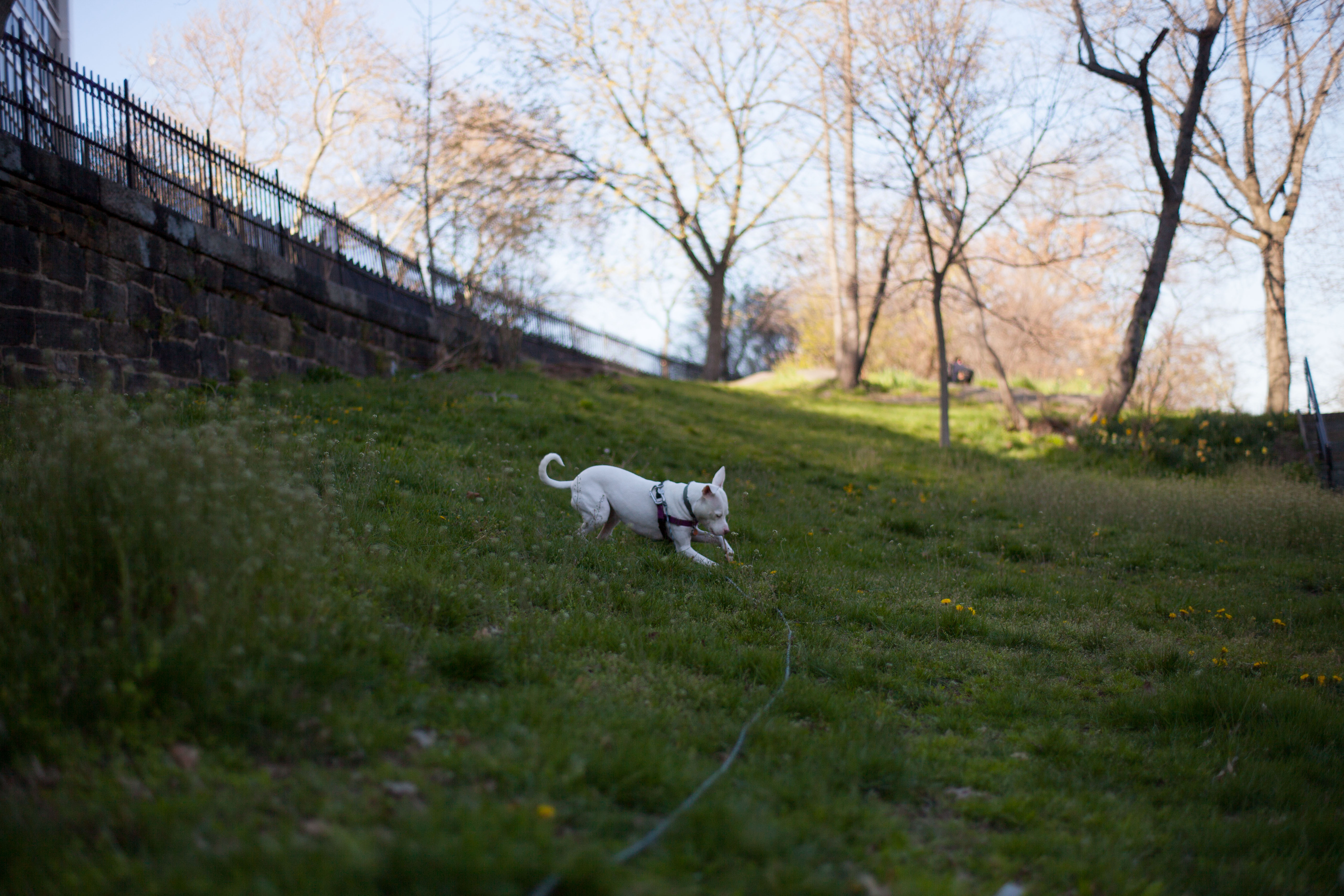
21 Apr Solving Problems: Learning To Learn
It’s easy to lend a helping hand when it’s our furry little pal doing the asking – those super cute, doleful eyes just begging for that treat in your hand…. Of course, we’re always told to get our pups to do what we ask them to before giving them that tasty reward, so it’s obviously tempting for us to push our pup along a little, just to help out. We all want to encourage her, but we may be doing the opposite of what we hope…
[mk_padding_divider size=”40″][mk_image src=”https://www.puptopianyc.com/wp-content/uploads/2016/01/KIMG9366.jpg” image_width=”800″ image_height=”350″ crop=”false” lightbox=”false” frame_style=”simple” target=”_self” caption_location=”inside-image” align=”left” margin_bottom=”10″]
[mk_padding_divider]
Hands Off!
Have you ever put your hand down on your dog’s butt while saying, “Siiiit?” Or been tempted to dangle that treat in front of her nose just to help? Seems like you’re showing her the way, right? Not necessarily. By doing what we think is a simple gesture, we are effectively doing the work. Think about it: practice makes perfect, right? Without doing the action independently how effective is it as practice?
Using our brain or brawn to elicit a desired response from our dogs cuts out the middle work: the problem solving and learning. We’re presenting a situation where we do the work, then congratulate her. In her head she isn’t being rewarded for when she sat. She is being rewarded because we did it, and she doesn’t have to figure it out. What a life!
A dog’s brain is remarkable! There’s always the stereotype that they are goofy, simple minded comics (and at times, well…) But! The brain of a dog can understand complicated situations, and needs the same challenges and growth as a human.
Every pooch learns differently–just like children. It’s part of their cognitive perception of the world around them. For example: Dogs who develop with less attentive owners tend to be a less dependant on humans. On the flip, dogs with attentive owners oftentimes learn to depend on them! We are not saying don’t love your dog and shower her with attention. But, for example, if you’re doing things for her, she will learn to let you.
That’s why it is important to allow her brain to develop by letting her figure out and solve problems to get what she wants. Food puzzles and games are great, but what about other ways of exercising that brain?
[mk_padding_divider]
Step Back
The first step in helping your pup to learn how to learn is to simply take a step back and be quiet. We love to blabber and “encourage,” but that usually looks like us doing most of the work for our pups! If you pace your cues, and wait, you’ll start to see her solve the problem.
The problem can present itself as “How Can I Get What I Want?” This is a good goal to begin training with. Offering your dog a reward for performing correctly can create a solid foundation for future problems: ones that may be more complicated or even a little intimidating to your dog!
Remember: a reward can be more than a treat. Treats are delicious! But if we approach rewarding the same way your dog approaches a problem, we see the question: “What does my dog want?” A treat isn’t always the answer.
For example: A dog who pulls a lot while on-leash wants to get moving! Offering her a treat for not pulling may not be the right reward. Instead, rewarding her with a looser leash, or even a faster pace will show her that she can get what she wants when she pays attention to you instead of forging full steam ahead. But how do we tell a pup that not doing something is what we want them to do, without doing all the thinking for them? Just pause, and wait a moment. As your pup tries to pull and pull, and gets no where, she’ll eventually stop pulling. Afterall, it wasn’t getting her anywhere. That’s when you step back into the picture and let your pup know that her stopping is what you wanted, by allowing her to move forward. You’ve let her solve the problem (hey! I’m not moving, but I want to be!) on her own (I stop pulling, I start moving!).
Keep an eye on what your dog wants, and use it as a reward. You’ll find that there’s a lot of variety!
[mk_padding_divider size=”40″]
See the Benefits
Why would you want a pup that knows how – or even enjoys – solving their own problems? For starters, have you ever had a particularly grueling day at work…mentally? Makes you want to head home and take a nap (or, let’s be honest, just go straight to bed). Same with our pups. Mental exercise can help address physical energy.
That’s just one of many benefits! A pup with the mental acuity to solve problems is a much more calm, even keeled pup. When situations arise, this pup doesn’t sweat the small stuff (like, should I sleep on my bed or my hoomans?), but already has the small stuff sorted. She knows how to think through it. That means she can focus on more important things, like whether to chew on your shoes or her antler (of course she’d choose the antler…we’re talking about our genius furbabies.) More realistically, a pup that has been exercising her brain does much better when that brain is put under stress. She’s prepared to deal with it, because she’s been given stressful situations to work through each day.
[mk_image src=”https://www.puptopianyc.com/wp-content/uploads/2016/01/IMG_20151229_145202.jpg” image_width=”350″ image_height=”400″ crop=”true” lightbox=”false” frame_style=”simple” target=”_self” caption_location=”inside-image” align=”left” margin_bottom=”10″]
Practice and Patience!
If you want your pup to automatically do some things, such as always sit when you stop walking, you have to practice…. Not asking. If we always tell them what to do, they’ll very quickly learn to wait for the cue instead of instinctively performing. So to practice being hands off, we have to actually be hands off–when you stop NYC dog walking, wait patiently for your pup to sit on her own (nearly all pups will eventually.) Reward that! She’ll pick up on the idea that when you stop, it means “Sit!” Even without your cue.
By letting her figure out all the tough stuff without your help, she’ll be more prepared to continue her learning, and her perception of stress. Putting aside time daily to give her puzzles can be a great way to develop her problem solving skills, and she’ll be well on the right path to exercising that cute, furry brain of hers!




No Comments